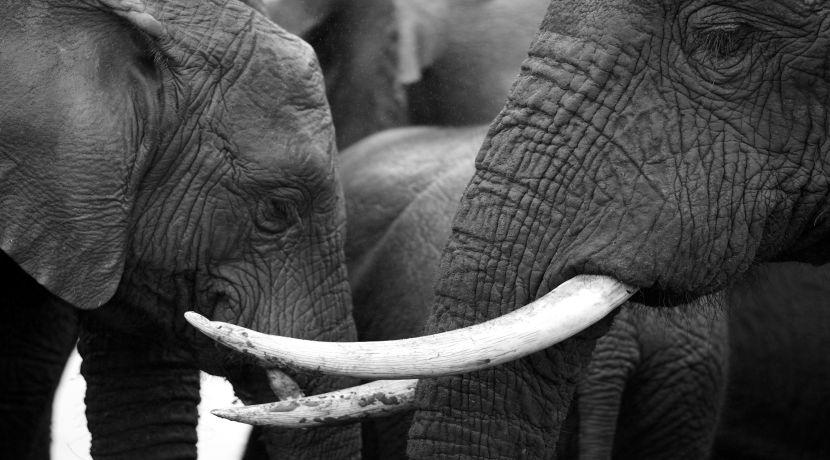The trading of ivory has been prominent since the early 1900’s and involves the (often illegal) act of obtaining tusks from animals such as the hippopotamus, narwhal and, most prominently, Asian and African elephants. Back at the turn of the 18th century, the number of African elephants alone is understood to have been around 3-5 million in the wild. Throughout the 1980’s, it is estimated that up to 100,000 elephants were being slaughtered for their tusks every year, leaving us today with just 470,000 African elephants left in the wild. As for Asian elephants, things are even bleaker, with just 40-50,000 left surviving. Despite changes in legislation regarding poaching, it is estimated that today around 20,000 elephants are still relentlessly killed every year to meet the demands of the trade.
So how did we get here? It has been reported that a pound of ivory can sell for as much as $1,500 on the black market, meaning that there is no surprise this vile trade is still prominent in the underbelly of society, particularly in the Far East. But even before this hushed notion of trade, the number of wild elephants was dropping at an alarming pace, and for all the more unnecessary reasons. Throughout history, ivory has been sadly viewed as a luxurious commodity, thus it was not at all uncommon to hear of rich tradesmen, royals, and affluent hunters seeking out what was sometimes known as ‘white gold’ to use as a symbol of their status. While many walks of life still fuel this trade today, it is easy to see and understand how affluence has influenced trade, igniting an ugly relationship between explorers of foreign lands and those who should have been trusted to take care of their native animals.

While ivory has, over time, repulsed and revolted many members of society (from animal rights charities to fashion designers, the common man all the way up to stars like Leonardo DiCaprio and Lupita Nyong’o), you only need to look back as recently as 2002 to see how prevalent the trade has been in the modern day – take, for example, the permission granted countries such as Botswana, Namibia and Zimbabwe to sell 60 tonnes of ivory stockpiles to Japan and China. This alone goes to show how prevalent such a seemingly prehistoric act can be and, as trade is still ongoing, it proves that there is much more needed to be done before the ivory trade is stamped out for good.
In 2011, an acceleration in outrage began, with illegal ivory being seized in Singapore and set alight. Reported as an ‘elephant’s graveyard giving hope to the future’, this signified not only the end of Singapore’s tolerance to the market but to ensure that trade would never again be legal or welcome. This act was soon followed by Gabon in 2012, once again burning a large quantity of ivory in protest, and also the USA and Philippines crushing their stockpiles. Finally, in 2014, many key countries followed suit, with the UK Government holding a High-Level Meeting on Illegal Wildlife Trade (centred on the prevalence of ivory in particular), leading to a huge number of commitments intended to protect elephants. But there is still a long way to go. Despite all of the above efforts, the Far East alone is still rife with illegal ivory trade, and an ever-present obsession with ivory plays a huge part in numbers continuing to fall. It is estimated that as soon as 2025, elephants could actually become extinct.

Prior to October 2017, UK legislation was that ivory produced after 1947 was banned in an attempt to help relieve poaching. However, April 2018 showed the UK fighting even harder against this, with petitions to ban the trade of ivory altogether, irrespective of its production date (with limited exceptions). The environment secretary for the United Kingdom, Michael Gove, has said that this ban will be 'one of the toughest in the world' trumping laws in China and the United States. The US enforces a ban on items which are 50% ivory, or those older than 100 years, and the Chinese ban excludes 'relics' but has no specific restriction on the date of production.
Michael Gove says; "the new law would reaffirm the UK's global leadership on this critical issue, demonstrating our belief that the abhorrent ivory trade should become a thing of the past. Ivory should never be seen as a commodity for financial gain or a status symbol."
More information on this matter can be found on BBC's website by clicking here.
While it can be hurtful to know that so many countries still take part in ivory trade, it must be noted that a huge amount of income is still based on this awful act and, thus, we must ensure that our intolerance is loud and clear. Africa and Asia are now both home to multiple elephant sanctuaries, which means that the money from more ethical tourism can go into conservation for these beautiful creatures. Not only that, but volunteers are openly welcomed to take care of those that have been liberated from capture, as well as tracking newborn elephants and feeding back to local governments with facts and findings on their natural behaviours. Through ethical tourism, a crackdown on trade and increased awareness, we are finally beginning to see stabilisation in the number of wild elephants and, if we continue down this path, we can ensure a positive future for the next generation of animals and adventurers alike.
If you want to play your part in the preservation of elephants, please view our project page.

















